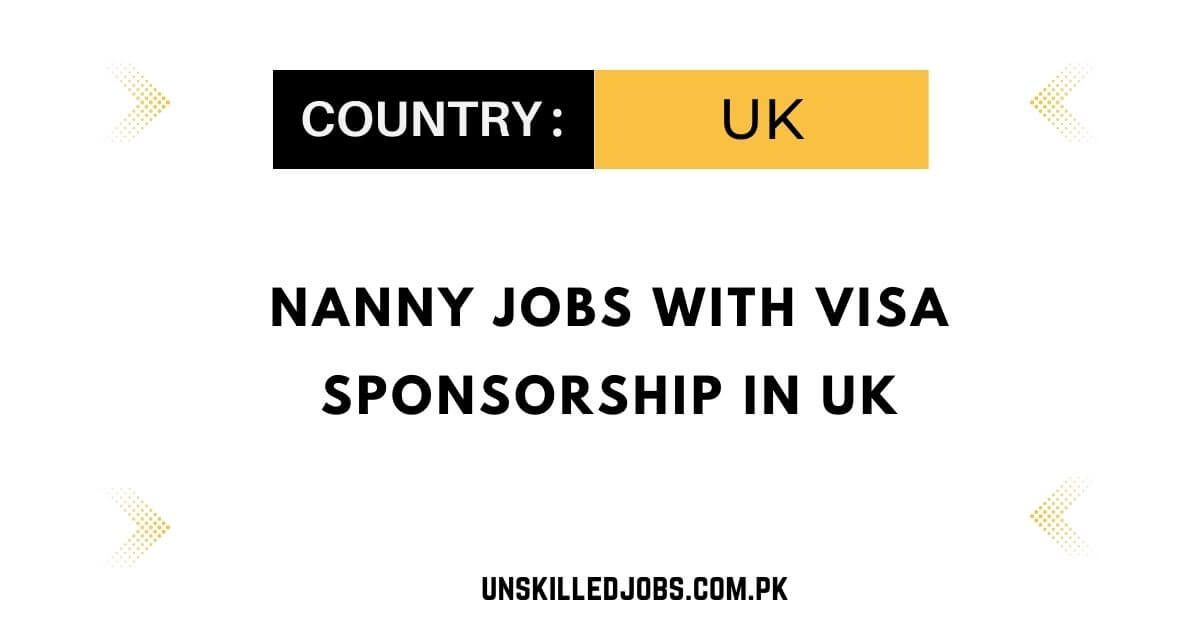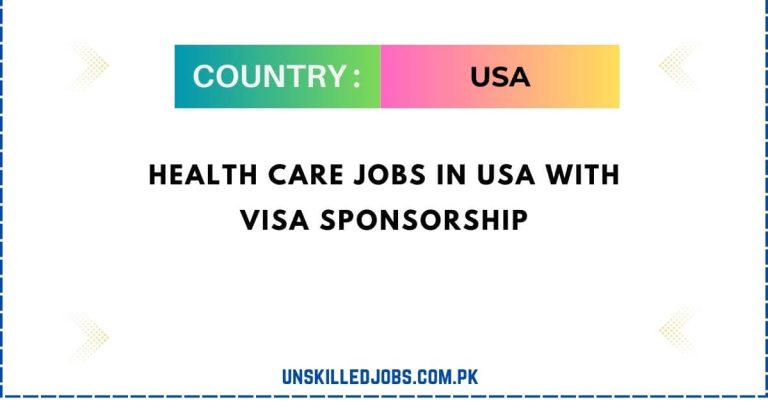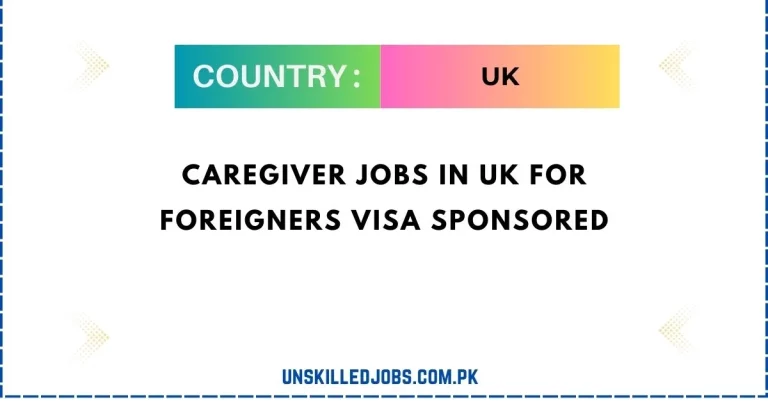Nanny Jobs with Visa Sponsorship in UK – Apply Online
Nanny jobs in the United Kingdom provide a pleasant and rewarding employment opportunity for persons who are passionate about childcare and the development of young minds. Nannies play an important role in giving children attentive care, support, and guidance in the home. With a growing demand for professional and compassionate nannies, the UK invites international candidates through visa sponsorship possibilities to join its dynamic childcare community. This article discusses nanny positions in the United Kingdom, the visa sponsorship process for overseas candidates, the importance of nannies in children’s development, and important recommendations for ambitious nannies looking to make a good difference in the lives of children.
Details About Nanny Jobs with Visa Sponsorship in UK:
- Title: Nanny Jobs with Visa Sponsorship in UK
- Company: Not Specified // Government and Private Sectors
- Location: London, United Kingdom
- Vacancies Offer: 10+
- Salary: £ 10.00 – £ 20.00 Monthly
- Country: United Kingdom
- Education: Secondary // Bachelor Degree / Diploma
- Experience: 1-2 Years of Experience
1. Nannies’ Support for Children’s Emotional Well-Being in Childcare:
Nannies provide a safe, nurturing atmosphere as well as emotional support and stability for children’s overall well-being and development.
Early Learning and Development Promotion
Nannies play an important role in a child’s early educational development. They engage children in educational activities, encourage curiosity, and promote social and cognitive development.
2. Sponsorship of Visas for Nanny Positions in the UK:
Work Permits for Qualified Nannies
One of the work visa options they can look into is the Tier 2 (General) Visa, which permits international applicants with childcare experience and knowledge to work in the UK with sponsorship from a registered firm.
Support from UK Families and Organisations
Many UK families and daycare centers actively support brilliant nannies from other countries in order to provide their children with the greatest care and help available.
3. Nannies’ Responsibilities:
ensuring supervision and safety
One of the primary responsibilities of nannies is to ensure the safety and well-being of the children in their care. Nannies keep an eye on children during play, meals, and other activities to prevent accidents and offer a safe environment.
participating in play and educational activities
Nannies encourage children to engage in play and educational activities that promote physical, mental, and emotional development. They plan age-appropriate games, storytelling sessions, and creative projects to foster a love of learning and creativity.
4. Requirements and Capabilities for Nanny Positions:
Experience and certification in childcare
Nannies with prior childcare experience or relevant early childhood education qualifications are in high demand. Experience working with children of diverse ages and backgrounds displays the ability to provide individualized care.
Determination and Flexibility
Nannies with prior childcare experience or relevant early childhood education qualifications are in high demand. Experience working with children of diverse ages and backgrounds displays the ability to provide individualized care.
Bonding and Communication with Children
Nannies must be able to communicate effectively with children in order to understand their wants, needs, and feelings. Developing a strong bond with children facilitates a trustworthy and nurturing relationship.
Check Also: Visa Sponsorship Cleaner Jobs In UK For Foreigners
5. Benefits of Nanny Jobs with Visa Sponsorship in UK:
- Legal Work Status: Visa sponsorship ensures that you have the legal right to work as a nanny in the UK. This avoids the possibility of working illegally and risking legal consequences.
- Stable Income: Nanny employment often comes with a regular and secure income, frequently with a fixed pay and occasionally additional benefits such as housing or food allowances.
- Cultural Experience: Working as a nanny in the UK allows you to immerse yourself in British culture and develop a better grasp of the country’s customs and way of life.
- Childcare Experience: Nanny positions provide you with valuable childcare experience, which might be useful if you want to work in early childhood education or childcare.
- Accommodation and Meals: Some nanny jobs in the UK provide accommodation and meals as part of the remuneration package, allowing you to save money on living expenses.
- Work-Life Balance: Many nanny positions have set work hours, which can provide a better work-life balance than other occupations that may need irregular or extended hours.
- Childcare Training: Some workplaces may provide nanny training or certification possibilities, which can improve your abilities and qualifications in the childcare area.
- Travel Opportunities: Depending on the family you work for, you may be able to travel with them both in the UK and abroad, which may be an interesting experience.
- Personal Development: Caring for and nurturing children as a nanny can be extremely satisfying and contribute to your personal growth and development.
- Networking: Nanny positions can allow you to connect with other childcare providers and families, which can be valuable for networking and potential job chances.
- Language abilities: Working as a nanny in the UK can help you enhance your English language abilities through immersion and everyday interaction with native speakers.
- Access to Healthcare: As a legal worker in the United Kingdom, you have access to the National Health Service (NHS), which offers healthcare services to residents, giving you peace of mind about healthcare coverage.
Requirement
- Job Offer: Get a job offer from a company in the UK that will fund your visa. The job offer should be for a babysitter to watch children and should include information like duties, pay, hours, and length of employment.
- Qualifications and Experience: Have the right qualifications and experience working with kids or teaching them early learning. Some examples of these are a Childcare Level 3 Diploma, an Early Years Educator (EYE) award, or something similar. It helps if you have worked as a nanny or in a babysitting setting before.
- Language Skills: Show that you can speak and write English well. You’ll need good communication skills to work with kids and talk to parents and other workers. Some companies may want applicants to show that they can speak and write English well by taking tests like the IELTS (International English Language Testing System).
- Sponsorship for a visa: The employer must be able to and ready to do so. If necessary, they will have to get a Certificate of Sponsorship (CoS) from the UK Visas and Immigration (UKVI) and back up your visa application with paperwork.
- Background Checks: You must go through background checks, which may include criminal record checks (DBS checks in the UK) and other checks that are needed to make sure you are fit to work with children.
- Checks for Health: Depending on the type of visa and length of stay, applicants may need to go through medical exams to make sure they meet UK health standards.
- Financial Stability: Show proof that you are financially stable, including proof that you can pay for your own expenses while you’re in the UK if your visa doesn’t allow you to work right away.
- Compliance with Immigration Rules: During the whole process of sponsoring a visa, both the company and the candidate must follow UK immigration rules and policies.
6. Understanding the Nanny Industry:
Knowledge of Family Expectations
Each family’s nanny’s expectations and preferences may differ. Nannies should make the effort to understand and respect these expectations in order to provide a smooth caring experience.
cooperating with guardians and parents
Each family’s nanny’s expectations and preferences may differ. Nannies should make the effort to understand and respect these expectations in order to provide a smooth caring experience.
7. Applying for nanny jobs: How to Prepare
Customizing cover letters and resumes
When resumes and cover letters are precisely crafted to highlight relevant childcare experience, qualifications, and dedication, the likelihood of attracting the attention of potential employers increases.
Manifesting Commitment to Childcare
During interviews, prospective nannies should exhibit their enthusiasm for childcare and provide examples of how they have positively impacted the lives of children in the past.
Emphasising Language Competence
Foreign nanny applicants must exhibit strong language skills, particularly in English, in order to communicate successfully with both parents and children.
8. Moving to the UK and settling there:
Obtaining the Necessary Visas and Work Permits
Before moving to the UK for a nanny job, candidates must ensure they have the necessary work permits and visas to legally operate in the nation.
Locating Appropriate Accommodation
Finding a suitable property that meets the nanny’s tastes and is close to the employer’s house is critical for a successful transfer to the UK.
Accepting the Childcare Community in the UK
Participating in local childcare communities, attending childcare courses, and joining parental groups can provide valuable knowledge, support, and a sense of belonging in the UK’s childcare environment.
For More Info:
Email Your CV, and We’ll Find the Best Pathway For you: info@unskilledjobs.com.pk
Conclusion:
Nanny jobs are available in the UK for those who are passionate about nurturing and caring for young children, and they can give a satisfying and gratifying professional path. Nannies establish a safe, loving environment that encourages learning, growth, and pleasure as vital building blocks in the development of young children. By understanding the visa sponsorship process, showcasing relevant childcare experience and skills, and embracing the UK’s childcare community, international candidates can embark on a transformative journey to shape the lives of the next generation, making a positive and lasting impact that transcends borders.
Frequently Asked Questions
What qualifications do you need to be a nanny UK?
Though it may be feasible to begin working to become a nanny without any qualifications, numerous companies and employment agencies might prefer that you have some previous experience with playwork or childcare.
Are nannies in demand UK?
‘Since the pandemic, demand for nannies remains very high, with the departure rules putting restrictions on EU nannies and au pairs working in the UK, and an increase in families – encouraged by changes in the workplace – removing to rural areas that aren’t always.
How many hours do nannies work in UK?
A full-time nanny works 5 days a week, Monday to Friday, for 8 to 12 hours per day. It’s been an extended day, and as any parent understands, caring for children can be exhausting. An experienced, professional nanny is going to be looking for an adequate wage that fits their skills and the demands of your position.







